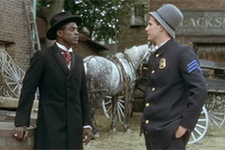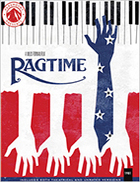Ragtime
|  When E.L. Doctorow’s novel Ragtime was published in 1975, it seemed ready-made for the screen. A grandly ambitious, satirical pastiche of American culture, history, fable, and myth set in the early years of the 20th century, it mixed and matched, blurred and confounded reality and fiction and starred a ginormous cast of real-life historical figures, including escape artist Harry Houdini, banker J.P. Morgan, business magnate J.D. Rockefeller, auto maker Henry Ford, educator and civil rights pioneer Booker T. Washington, architect Stanford White, socialite Evelyn Nesbit, anarchist Emma Goldman, and psychologists Sigmund Freud and Carl Jung. It is no wonder that the cultural critic Frederic Jameson used it as a primary focus in the final version of his canonical essay “Postmodernism, or the Cultural Logic of Late Capitalism.” Producer Dino De Laurentiis immediately put the work of adapting Ragtime into the hands of director Robert Altman, whose masterpiece Nashville (1975), which not incidentally came out the same year as Doctorow’s novel, had accomplished cinematically what the novel had done on the page. Unfortunately, Altman’s next film, Buffalo Bill and the Indians, or Sitting Bull’s Lesson (1976), was a critical and commercial disappointment, and he lost the project, which instead went to director Milos Forman, who brought on screenwriter Michael Weller, who had adapted the stage musical Hair for Forman’s 1979 film version. Rather than recreate the novel’s broad panorama of characters and stories, Forman and Weller sought to streamline it, focusing on a small handful of narratives. The resulting film works in its own right, but it is an entirely different beast from the novel, which is perhaps why the novel’s fans and literary critics look at it so disparagingly. The film begins with the sordid, tabloid tale of the baby-faced millionaire industrialist Harry Kendall Thaw (Robert Joy), who is incensed when the architect Stanford White (Norman Mailer) uses his wife, a former chorus girl-turned-socialite named Evelyn Nesbit (Elizabeth McGovern), as a model for a nude statue he places atop Madison Square Garden. The infuriated and clearly deranged Thaw ends up publicly shooting White to death, in a scene that is surprising in its graphic violence, especially by the typical standards of PG-rated fare (the same could be said for the film’s rather copious nudity, which brought more than few angry letters to the office of the MPAA ratings administration). The murder leads to a media-circus trial in which Thaw is declared temporarily insane, while his wealthy family attempts to manipulate Evelyn (who is exceedingly dim, but also extremely ambitious) to their own ends. The second part of the film, which is only tangentially related to the first part, focuses on the story of a wealthy New York family headed by Father (James Olson) and Mother (Mary Steenburgen), who take in a poor black girl named Sarah (Debbie Allen), who abandoned her infant in their garden out of desperation. The baby’s father, Coalhouse Walker Jr. (Howard E. Rollins Jr.), is a financially successful piano player who wants to reconcile with Sarah and come together as a family. However, Coalhouse’s familial ambitions are waylaid when he is made the victim of a vicious prank by a racist firehouse chief, Willie Conklin (Kenneth McMillan), who clearly cannot cope with a black man owning a shiny Model T. When Coalhouse demands restitution and is rejected at every legal turn, he and a group of friends (including Mother’s younger brother, played by Brad Dourif) hatch a plot to assassinate various firefighters and then take over the Pierpont Morgan Library in Manhattan and hold it hostage until Conklin is turned over to him. The two parts of the film are linked together by several additional characters, including Dourif’s Younger Brother, who becomes obsessed with and begins an affair with Evelyn. Similarly, Mandy Patinkin’s Tateh, who we meet in the first half of the film as a poor street artist struggling with an adulterous wife (Fran Dresher), later turns up as a film director shooting a movie starring Evelyn on the shores near Atlantic City, where Father and Mother, who are supportive of Coalhouse’s case, run when racial hostility and an overbearing press drive them out of their home. These connections are largely tangential, though, and give only the barest sense of cohesion. Forman, a Czech immigrant who was drawn throughout his career to stories that personified the many and often contradictory strands of American culture, is clearly most energized by Coalhouse Walker’s story, as it dominates more than half of the film’s running time and develops a dramatic head of steam that the first part of the film, which feels fragmentary and unfocused, does not. It is all too easy to appreciate Coalhouse’s feeling infuriated with both his humiliation at the hands of Conklin and the lack of interest shown by the justice system in making things right. It is hard not to empathize with his later, violent actions, which are terrorist in nature, but derive from a deep, generations-old well of injustice that extends far beyond his singular situation. Forman, having escaped the yolk of Soviet Communist oppression in Czechoslovakia, is at his best when dramatizing his characters’ various, conflicting interests, which range from the (perhaps overly) despicable and indefensible Conklin, to the struggle of New York Police Commissioner Rhinelander Waldo (James Cagney, emerging from two decades of retirement) to uphold the law while also recognizing the inequality that fuels Coalhouse’s actions. Shot by Miroslav Ondrícek, a fellow Czech émigré who had shot Forman’s early films Loves of a Blonde (1965) and The Fireman’s Ball (1967), as well as his Hollywood films Taking Off (1971) and Hair, Ragtime looks great and captures the feel of the era in its Oscar-nominated production design by John Graysmark. The film flounders in its rhythms, though, and the editing is sometimes jagged, suggesting that there should be more than there is (the release of the director’s workprint, which includes about 20 minutes of additional footage, smooths some of this). The film’s title, derived from the uniquely African American musical style of the era, captures the essence of the melting-pot ideal, even though it doesn’t quite come through in the film. Forman’s strong focus on racial injustice, while admirable, neverthless crowds out the broader notion of America as a place of both contention and coming together.
Copyright © 2022 James Kendrick Thoughts? E-mail James Kendrick All images copyright © Paramount Home Entertainment | |||||||||||||||||||||||||||||
Overall Rating: 

 (2.5)
(2.5)


